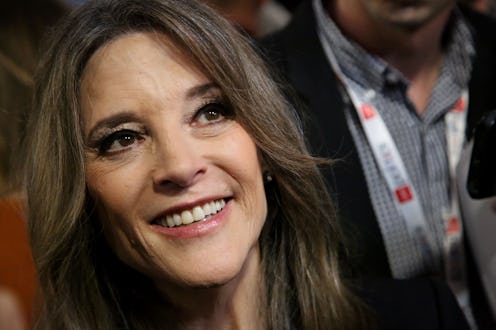News
Listen To Disabled People When We Tell You Marianne Williamson's Positive Thinking Is Toxic

In this op-ed, Liz Moore, a chronically ill and neurodivergent disability rights activist and writer, explains why the attention on Marianne Williamson's Democratic debate performance should instead be focused on how her election would harm disabled people.
After the Democratic debates, Marianne Williamson quickly became quirky meme fodder across the internet. She has bold ideas regarding reparations, yes, but does that mean we should elect this crystal-loving woman to the Oval Office? Williamson's platform of love and positivity might seem appealing, but abled people would benefit from listening to disabled people, because we can see the dangers Williamson poses to our community.
In Williamson’s 1996 book A Return to Love, she reasoned that when it comes to taking medication, “the healing doesn’t come from the pill. It comes from our beliefs.” Let’s take this to its logical extreme. If a pill doesn’t work, is it because our beliefs are not strong enough? Incorrect? Full of hate? She wrote that “sickness is not a sign of God’s judgement on us, but of our judgement on ourselves. ... Sickness is an illusion and does not exist.” On Twitter, Williamson described depression as a “spiritual disease.” In her 2012 book A Course in Weight Loss, she wrote that men who have AIDS should forgive people in order to heal, comparing it to how a cancer patient would complete chemotherapy.
As a disabled person, this kind of unscientific thinking is a red flag. There is a certain type of person you meet when you are visibly disabled or disclose an invisible illness. This person, usually abled, wants to help you “get well soon” — even if you have a chronic, incurable disease. They offer unsolicited health and wellness tips ranging from going vegan to trying “alkaline water.” And while these people may be well-meaning, the overall effect of their unwanted advice is to situate the blame for our chronic, incurable diseases on the people suffering from them. The implication is that if you just tried harder you could get well. This is extremely toxic for disabled people, and yet we encounter it all the time.
When it comes to policy, Williamson seems to have good ideas regarding U.S. health care. According to her health care platform, she is in favor of universal health care, which would help uninsured disabled people. She proposes addressing environmental issues like restoring the Clean Water Act and reinstating bans on pesticides, which contribute to health disparities, although she does not address the environmental racism that affects disabled people of color.
However, Williamson also holds deeply problematic views about health care. She previously expressed that it was “Orwellian” for the government to require vaccines. She later walked back her comments, stating that while she supports vaccines, she is for individual bodily autonomy rather than a government mandate for vaccination. Williamson has also repeatedly said she is deeply suspicious of “Big Pharma.”
She is the epitome of what disabled people have described as “toxic positivity,” or the belief that positive thinking will cure you.
Disabled people have a complicated relationship with pharmaceutical companies. On the one hand, insulin, antidepressants, Epi-Pens, antibiotics, and other medications help keep us alive. On the other hand, generic drug makers have been accused of price-fixing, leading to a class action lawsuit that 40 states have joined. If these accusations are correct, pharmaceutical companies have colluded to bilk patients out of their already limited incomes. Drug companies are arguably profiting from patients’ suffering, and though Williamson’s platform names cost as a stressor negatively affecting patients, she does not suggest regulating the cost of prescription drugs. Disabled — as well as abled — people need a president who will do so. Our very lives depend upon it.
Rather than helping disabled people access the life-saving treatments “Big Pharma” can offer, it seems Williamson would prefer that we seek out alternatives to pharmaceuticals. I have certainly benefited from complementary therapies like acupuncture, meditation, and lifestyle changes. I specify “complementary therapies” as opposed to “alternative therapies,” because I use them in conjunction with medication. Williamson’s health care platform waxes poetic about things such as reducing societal stress through more vacation time, “develop[ing] healthy habits at a community level,” and changing the American diet. She is so distrustful of “Big Pharma” that I believe she may be unable to work with pharmaceutical companies to successfully help disabled people find and access much-needed treatments.
Williamson may seem lovey-dovey and harmless. Yet she is the epitome of what disabled people have described as “toxic positivity,” or the belief that positive thinking will cure you while negative thinking will make you sick, hateful, and unhappy.
If you aren’t disabled, you may miss the undertones of what Williamson’s health care policies could mean if she were elected. Disabled people, however, face unscientific thinking, unsolicited advice, fear of “Big Pharma,” and toxic positivity all the time. We are primed to recognize these attacks for what they are. They are a threat to our ability to access care, because those mindsets say we should just fix our “negative attitudes” rather than getting a life-saving prescription.
Our disabled lives are not some negative tragedy. We don’t have to “think ourselves well” to be valuable members of society. We are not spiritually inferior to abled people. Abled people need to listen to our concerns about Williamson. After all, disabled or not, we all need health care.